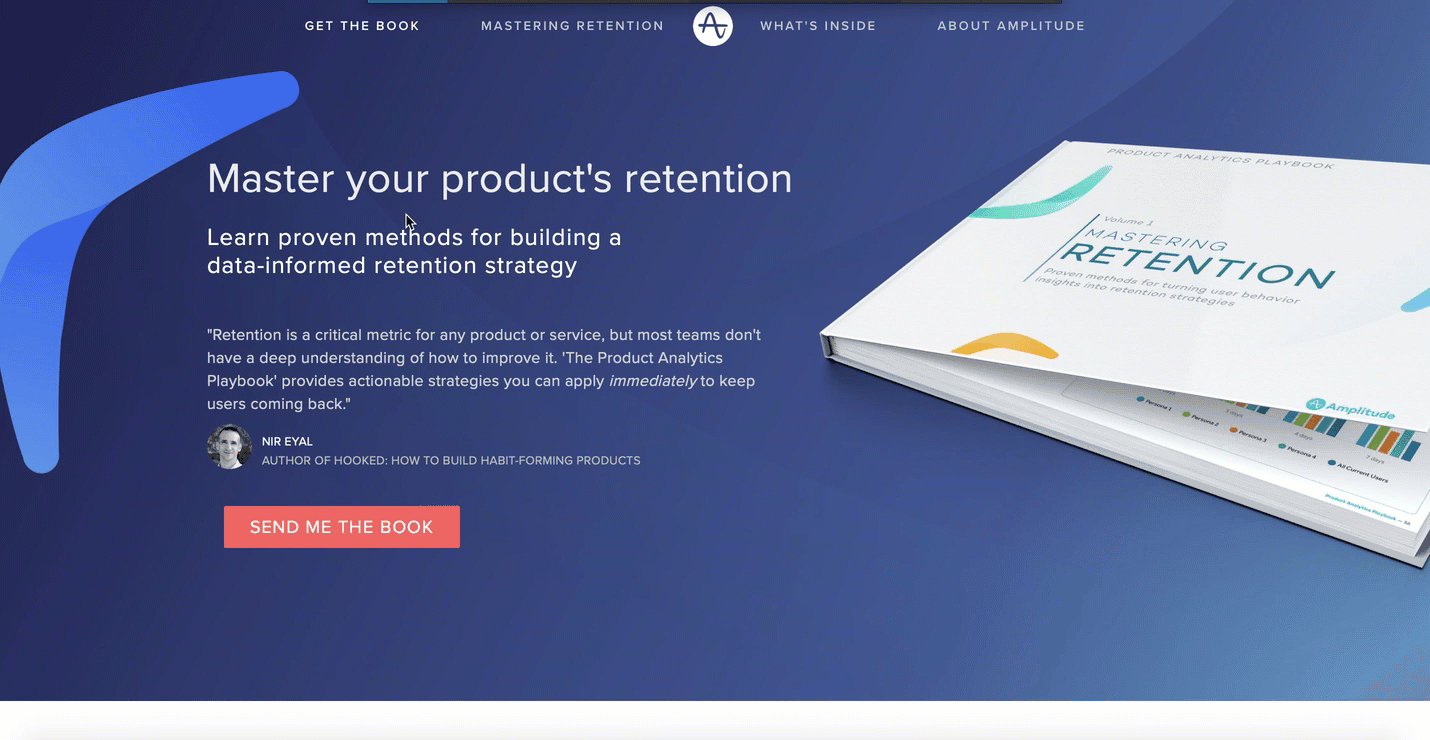Three Things I Like about Amplitude's Mastering Retention Ebook
David McCarthy
Even ten years after the ebook format peaked, Amplitude’s Mastering Retention shows why the ebook is an authoritative, durable format—at the right time.
I know. Ebooks are so 2008.
They peaked in 2010, and their novelty has been decaying since. Many are more or less slide decks positioned as ebooks or disparate articles duct-taped together. Many aren’t worth an email address. And many don’t make me remember the brand. But Amplitude’s Mastering Retention isn’t your standard ebook.
Amplitude makes the case for ebooks
When debating whether to invest in developing an ebook, maybe we’re asking the wrong question. Instead of “How many leads will it bring in?” and (the inevitable) “Well, how long will it take to put one together?” maybe we should ask “How much would a prospect pay to read this?” If the answer is around $15, the rough estimated cost of a business paperback, then the ebook may be the right call.
Amplitude’s Mastering Retention seems worth twice that. Published back in 2017, the product analytics playbook resembles an actual product from a publisher, fitted out with an incredible landing page.
Mastering Retention even has its own ProductHunt page, where the Amplitude team perfectly positioned their asset:
Until now, most available resources only list tactics and “growth hacks,” offering little guidance on developing a comprehensive retention strategy. The Product Analytics Playbook: Mastering Retention fills that gap; it's the culmination of years of working with the industry's top product teams and retention experts.
The ebook delivered. About a year after its publication, Amplitude announced more than 12,000 people downloaded the book.
I’m not in product management. But Mastering Retention is content I keep going back to. A tab for it is open on my personal laptop and my work laptop daily. I glance at it not only because of its subject, but also because of three things Amplitude executed flawlessly on.
Amplitude Chose the Right Format at Exactly the Right Time
Customer retention is not a new concept. But “product analytics,” Amplitude’s product category, relatively is. And, as the Google Trends line graphic shows below, interest in both was rising steadily when Amplitude published the ebook.
Meanwhile, on Amazon, few books on the intersection of product analytics and customer retention seem to have existed. While there were plenty on marketing analytics, data analytics, and lean start-up analytics, few, if any, focused solely on product analytics. (The lone credible text I could find was actually published this year, in 2020.) In short, Amplitude met a major demand before business book publishers were able to--a major feat.
(Perhaps the reductive “equation” for determining whether an ebook is appropriate is as follows: Rising search volume + low search competition + minimal commercial products. Here’s my reasoning:
Rising search volume signifies growing demand or interest in the topic.
Low search competition signifies few authoritative experts on the topic.
Minimal commercial products reaffirms the concept has not flooded the market.
In other words, if a publisher has already printed a text on the topic, is it safe to assume competition is too high for it?)
Mastering Retention is Exhaustive—in an Invigorating Way
The ebook is 156 pages long, and it is broken into eight chapters, an appendix, and a glossary:
Why You Need To Care About
Your Critical Event And Product Usage Interval
The Retention Lifecycle Framework
Product Analysis Toolkit
Current User Retention
New User Retention
Resurrected User Retention
What To Do Next
Appendix: Instrumentation
Glossary
Each chapter is approximately twenty pages long, and each page has about four-hundred words, supported with graphics and charts. In short, Mastering Retention is dense, which is exactly what an ebook purporting expertise should be.
Contributors with Actual Expertise and High Social Reach Potential
Mastering Retention’s “masthead” compares to a peer-reviewed journal. Included are eleven names, many of which are renowned in their field. (For example, Julie Zhou, credited as a quasi-editor and SME, is a former vice president of product design at Facebook and author of The Making of a Manager.) Below are the names listed as subject matter experts and contributors, including several Amplitude team members:
Nir Eyal
Julie Zhou
Fareed Mosavat
Alicia Shiu
Archana Madhavan
Justin Bauer
Xin Cao
Nisha Dwivedi
Tareq Ismail
Michael Ottavi-Brannon
Varun Sharma
Wendy Vang
So many sources of expertise offer a major advantage in the content quality and credibility. But that’s not the only advantage. Their contributors have notable social followings: of the twelve contributors, eleven have more than 500 connections on LinkedIn.
Combined, the contributors’ LinkedIn connections amount to approximately 5,400 today—that’s nearly twenty-five percent of Amplitude’s followers (16,650). Provided they promote the ebook, the contributors can potentially increase the reach of social media promotions for the asset by twenty-five percent.
Could It Hold Up in 2020?
There is more to content marketing than ebooks (🙏), especially now. Today, podcasts, certification courses, TV shows, and insider groups are gaining traction. But an ebook on this topic still makes sense. For a hungry market lacking an authoritative piece, few formats connote authority like the book can, and when its quality is superior, few are as memorable.





